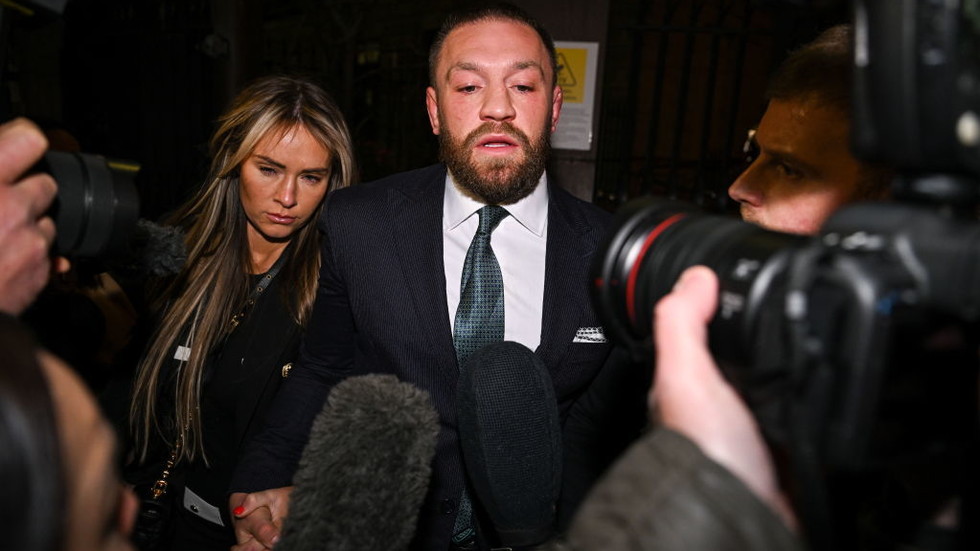A jury in Ireland has ruled against UFC fighter Conor McGregor in a civil case brought by Nikita Hand, an Irish woman who accused him of assaulting her in a Dublin hotel room back in 2018. Following deliberation that lasted over six hours, the jury awarded Hand nearly €250,000 (approximately $260,000). Hand had alleged that McGregor and his friend, James Lawrence, sexually assaulted her after a Christmas party in December of that year. Throughout the trial, she recounted her harrowing experiences in a courtroom setting, claiming that she had thought she was going to die during the alleged assault, as McGregor placed her in a chokehold. In contrast, McGregor vehemently denied the charges, asserting that any sexual encounter between them was consensual and vigorous but not rough, and categorized Hand’s testimony as falsehood.
The incidents leading to the legal battle began the night of the alleged assault when Hand initiated contact with McGregor, leading him to give her and a friend a ride to a private party in a penthouse suite at the Beacon Hotel. Attendees reportedly engaged in heavy drinking and drug use, including cocaine. The situation reportedly took a dark turn when McGregor escorted Hand to a bedroom, where she claimed the assault occurred. During her testimony, she recounted being subjected to multiple chokeholds and described a particularly disturbing remark McGregor allegedly made: “Now you know how I felt in the octagon where I tapped out three times.” A paramedic who examined Hand the following day noted significant bruising on her body, and she was later diagnosed with post-traumatic stress disorder (PTSD), which she attributed to the traumatic experience.
In defense, McGregor’s legal team presented surveillance footage that they argued depicted Hand behaving amicably with McGregor, including moments where she reportedly hugged him and kissed his arm, suggesting that she was not in distress after the incident. This video was aimed at undermining her claims and painting a different picture of the events that took place that night. McGregor’s representatives contended that these actions were inconsistent with the narrative that Hand had portrayed in her allegations. However, the jury ultimately deemed McGregor liable for the assault, a verdict that left the UFC star visibly shaken as reported by witnesses in the courtroom.
After the jury’s findings, McGregor expressed his dissatisfaction with the outcome in a public statement. He indicated that he was disappointed that the full scope of evidence had not been considered during the trial, leading him to intend to appeal the jury’s decision. In his statement, he emphasized that he would be focusing on his family and future despite the ruling against him. The legal battle also highlighted the complex encapsulation of fame and accountability within the realm of sports figures assessed through the lens of sexual misconduct allegations.
Meanwhile, Hand’s legal claims against McGregor’s associate, James Lawrence, were not successful, as the jury found no grounds to hold him liable for the assault. Despite this partial outcome, the case against McGregor has garnered significant media attention, not only for its implications in McGregor’s career but also for broader discussions about consent, abuse, and the treatment of women in potentially exploitative situations, particularly within high-profile contexts. Nikita Hand’s journey through the legal system serves as a pertinent reminder of the challenges victims of sexual violence face, especially when the accused is a public figure.
This trial marks a significant moment in contemporary discussions surrounding sexual assault allegations in the world of professional sports and entertainment. It underscores how narratives of power, influence, and the right to justice play out in the courtroom, showcasing the serious consequences of actions deemed abusive. The awarding of damages against McGregor by the jury may impact his public image and career in the future, while it also opens the door for ongoing discourse on victim rights and the need for accountability among high-profile individuals. The outcome reflects not just a legal judgment, but also a societal stance on the importance of believing and supporting those who come forward with allegations of assault, reinforcing the narrative that such instances necessitate thorough examination and consequence regardless of the assailant’s fame or wealth.

